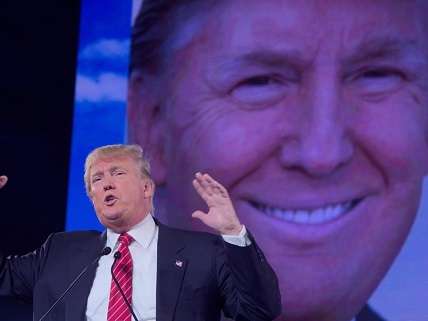Trump, Clinton, and 'Politicizing the Judiciary'
Do "litmus tests" for judicial nominees harm the Supreme Court?

The editorial board of The Washington Post is none too pleased about the manner in which presidential candidates Donald Trump and Hillary Clinton have been discussing the future of the U.S. Supreme Court. Trump, the Post says, is guilty of "further politicizing the judiciary" because he released a list of possible Supreme Court picks ahead of the fall election. Clinton is equally guilty, the Post says, on account of her promise to apply "a bunch of litmus tests" to her judicial candidates. "Committing to a list of judicial nominees at this point and promising to apply judicial litmus tests put the country on a dangerous path," the Post complains in an unsigned editorial.
What's the danger? Here's the Post:
Americans have long expected and should still expect that judges be guided by other values: careful thinking, reverence for the facts of specific cases, respect for the intent of the elected leaders who write the laws, openness to counterarguments, a healthy amount of modesty and allegiance to the notion that their rulings must bear a rational relationship to the laws they interpret and the precedents they have set. A world in which judges must at the very least address these expectations is far better than a world in which they are assumed to be wholly political actors who need offer no justification beyond, "I promised to rule this way."
Of course, every judicial nominee already sings the praises of "careful thinking," "openness," "modesty," and other such platitudes. The problem is that such lofty terms don't tell us anything about what actually matters when it comes to judging. What matters are the legal principles that a judicial nominee holds and the judicial philosophy that a nominee adheres to.
The idea of imposing a "litmus test" may be crude, but at least it has the virtue of possibly revealing something substantive about a given nominee's legal views. Likewise, Trump's SCOTUS list has the virtue of featuring actual judges with actual records that can be judged.
My own preference would be for judicial nominees to face some questions like this:
- Should the Constitution be interpreted according to its original public meaning at the time it was adopted? If yes, why? If no, why not?
- Woodrow Wilson said the Constitution should be interpreted as a living document that's flexible enough to "adapt itself to the new conditions of an advancing society." Do you agree with Wilson? If yes, why? If no, why not?
- In your view, what criteria must be met before the Supreme Court may properly overturn one of its own precedents?
The point behind these questions is to get judicial nominees talking about legal principles and judicial philosophy. That's the stuff that matters most when it comes to judging and it's not "politicizing the judiciary" to want to find out more about it.


Show Comments (53)